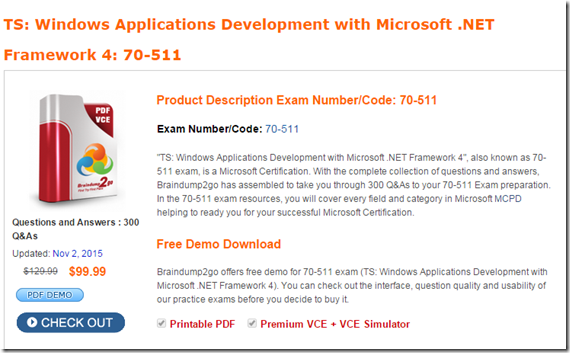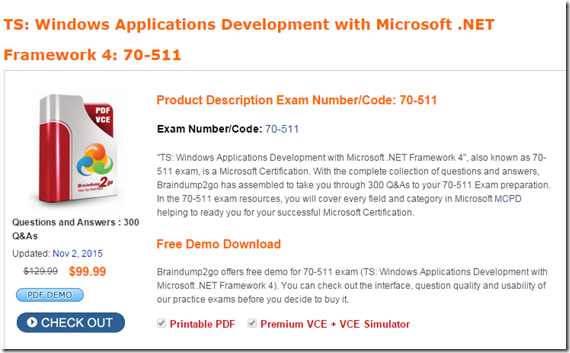13 11 2015
[PDF&VCE]Braindump2go 70-511 PDF Dumps Free Download (181-190)
MICROSOFT NEWS: 70-511 Exam Questions has been Updated Today! Get Latest 70-511 VCE and 70-511 PDF Instantly! Welcome to Download the Newest Braindump2go 70-511 VCE&70-511 PDF Dumps: http://www.braindump2go.com/70-511.html (300 Q&As)
Microsoft 70-511 Exam Questions has already been updated recently! Braindump2go Provide you the Latest 70-511 Exam Dumps: 70-511 PDF and 70-511 VCE! Braindump2go helps you keep in step with Microsoft Official Exam Center!
Exam Code: 70-511
Exam Name: TS: Windows Applications Development with Microsoft .NET Framework 4
Certification Provider: Microsoft
Corresponding Certifications: MCPD, MCPD: Windows Developer 4, MCTS, MCTS: Microsoft .NET Framework 4, Windows Applications
70-511 Dumps PDF,70-511 PDF,70-511 VCE,70-511 eBook,70-511 Study Guide,70-511 Certification,70-511 Exam Questions,70-511 Book,70-511 Dump,70-511 eBook PDF,70-511 Exam Preparation,70-511 Dumps Free,70-511 Braindumps,70-511 Practice Tests,70-511 Practice Exam,70-511 Practice Test Free,70-511 TS: Windows Applications Development with Microsoft .NET Framework 4

QUESTION 181
You use Microsoft .NET Framework 4 to create a Windows Presentation Foundation (WPF) application.
You add a TreeView control to show the hierarchical structure of orders and order details.
Each order contains an ObservableCollection named OrderDetails.
You write the following code fragment. (Line numbers are included for reference only.)
You need to ensure that the TreeView control meets the following requirements:
– Each order is shown as a TreeView node.
– The order nodes have order detail nodes as children.
– The order detail nodes have no children.
Which code fragment should you insert at line 07?
![image_thumb[1] image_thumb[1]](http://examgod.com/bdimages/74d11cb33d3d_F11A/image_thumb1_thumb.png)
A. <HierarchicalDataTemplate x:Key=”OrderTemplate” DataType=”Order”
ItemTeinplate=”{StaticResource OrderDetailTemplate} “>
<TextBlock Text=”{Binding Path=.}” />
</HierarchicalDataTemplate>
B. <HierarchicalDataTemplate x:Key=”OrderTemplate”
ItemsSource=”{Binding Path=OrderDetails}”
ItemTemplate=”{StaticResource OrderDetailTemplate}”>
<TextBlock Text=”{Binding Path=.}” />
</HierarchicalDataTemplate>
C. <HierarchicalDataTemplate x : Key== “Order Temp late”
ItertisSource=”{ Binding Path=orders>”
ItemTemplate=”{StaticResource OrderDetailTemplate}”>
<TextBlock Text=”{Binding Path=.}” />
</HierarchicalDataTemplate>
D. <HierarchicalDataTemplate x:Key=”OrderTemplate”
ItemsSource=”{Binding Path=orders}” DataType=”Order”>
<TextBlock Text=”{Binding Path=.}” />
</HierarchicalDataTemplate>
Answer: B
QUESTION 182
You are developing a Windows Presentation Foundation (WPF) application that displays opportunities from List (Of T) named Leads, where T is a class named Lead.
The Lead class contains the properties Title and Revenue.
You add a DataGrid control named dgQualifiedLeads to the MainWindow.xaml file.
You set the ItemSource property of dgQualifiedLeads to Leads as follows. (Line numbers are included for reference only.)
You need to ensure that CollectionViewSource is used to filter the list to display only Lead objects with revenue of more than $1,000.
What should you do?
![image_thumb[3] image_thumb[3]](http://examgod.com/bdimages/74d11cb33d3d_F11A/image_thumb3_thumb.png)
A. Insert the following code at line 22.
Leads.Filter = New Predicate (Of Object)(AddressOf FilterOut)
Add the following code segment to the code-behind of the MainWindow.xaml file.
Public Function FilterOut(ByVal item As Object) As Boolean
Dim lead As Lead = TryCast(item, Lead)
Return IIf(lead.Revenue < 1000D, True, False)
End Function
B. Insert the following code at line 22.
Leads.Filter =
New Predicate (Of Object)(AddressOf FilterOut)
Add the following code segment to the code-behind of the MainWindow.xaml file.
Public Function FilterOut(ByVal item As Object) As Boolean
Dim lead As Lead TryCast(item, Lead)
Return IIf(lead.Revenue > 1000D, False, True)
End Function
C. Insert the following code at line 22.
Leads.Filter =
New Predicate(Of Object)(
Function(s) DirectCast(s. Lead).Revenue > 1000D)
D. Insert the following code at line 22.
Leads.SortDescriptions.Add(New SortDescription(
“Revenue”, ListSortDirection.Ascending))
Answer: C
QUESTION 183
You are developing a Windows Presentation Foundation (WPF) application that displays pricing and inventory Information.
A list box’s ItemsSource property has decimal and string types.
Decimals represent price and strings represent messages such as “Discontinued”
The following markup is defined as follows. (Line numbers are included for reference only.)
You need to ensure that data templates are used to format the strings without changes and the decimals as currency.
Which markup segment should you insert at line 05?
![image_thumb[5] image_thumb[5]](http://examgod.com/bdimages/74d11cb33d3d_F11A/image_thumb5_thumb.png)
A. <DataTemplate x:Key=”clr:String”>
<TextBlock
Text=”{Binding StringFormat=Itein Error: {0}}”/>
</DacaTeroplate>
<DataTeroplate x:Key=”clr:Decirrtal”>
<TextBlock
Text=”{Binding StringForroat=Item Price: {0:C}}” />
</DataTemplate>
B. <DataTemplate x:Key=”String” Template=”clr:String”>
<TextBlock
Text=”{Binding StringFormat=Item Error: {0}}” />
</DataTemplate>
<DataTemplate x:Key=”Decimal” Template=”clr:Decimal “>
<TextBlock
Text=”{Binding StringFormat=Item Price: {0:C}}” />
</DataTemplate>
C. <DataTemplate DataType=”{x:Type clr:String} ,/>
<TextBlock
Text=”{ Binding StringFormat=Item Error: {0}}” />
</DataTemplate>
<DataTemplate DataType=”{x:Type clr:Decimal) “>
<TextBlock
Text=”{Binding StringFormat=Item Price: {0:C}}” />
</DataTemplate>
D. <DataTemplate DataType=, clr : String”>
<TextBlock
Text=”{Binding StringFormat=Item Error: {0}}” />
</DataTemplate>
<DataTernplate DataType=”clr: Decimal”>
<TextBlock
Text=”{Binding StringFormat=Item Price: {0: C}}” />
</DataTemplate>
Answer: B
QUESTION 184
You use Microsoft Visual Studio 2010 and Microsoft .NET Framework 4 to create a Windows Presentation Foundation (WPF) application.
You create a WPF window in the application.
You add the following code segment to the application.
The DataContext property of the window is set to an instance of the ViewModel class.
The Data property of the ViewModel instance is initialized with a collection of BusinessObject objects.
You add a TextBox control to the window.
You need to bind the Text property of the TextBox control to the Name property of the current item of the CollectionView of the DataContext object.
You also need to ensure that when a binding error occurs, the Text property of the TextBox control is set to N/A .
Which binding expression should you use?
![image_thumb[6] image_thumb[6]](http://examgod.com/bdimages/74d11cb33d3d_F11A/image_thumb6_thumb.png)
A. {Binding Path=Data/Name, FallbackValue=’N/A’ }
B. {Binding Path=Data.Name, FallbackValue=’N/A’ }
C. {Binding Path=Data/Name, TargetNullValue=’N/A’ }
D. {Binding Path=Data.Name, TargetNullValue=’N/A’ }
Answer: A
QUESTION 185
You use Microsoft .NET Framework 4 to create a Windows Presentation Foundation (WPF) application.
You write the following code segment. (Line numbers are included for reference only.)
You add the following code fragment within a WPF window control.
You need to ensure that the Contact class contains a business rule to ensure that the ContactName property is not empty or NULL.
You also need to ensure that the TextBox control validates the input data.
Which two actions should you perform? (Each correct answer presents part of the solution. Choose two).
A. Replace line 01 with the following code segment.
Public Class Contact
Implements IDataErrorInfo
B. Replace line 01 with the following code segment.
Public Class Contact
Inherits ValidationRule
C. Replace line 01 with the following code segment.
Public Class Contact
Implements INotifyPropertyChanging
D. Add the following code segment at line 03.
Public Event PropertyChanging As PropertyChangingEventHandler
Modify line 08 with the following code segment:
Set
If Me.PcopertyChanging <> Nothing Then
Proper:tyChanging(Me, New PropertyChangingEventArgs(“ContactName”))
End If If String. IsNull OrEmpty(value)
Then
Throw New ApplicationExceptionf’Contact name is required”) End If
contactNaroe = value
End Set
E. Add the following code segment at line 12.
Public Readonly Property [Error] ()
As String
Get
Throw New Exception( string.Empty )
End Get End Property
Public Default Readonly Property Item(columnName As String)
As String Get If columnName = “ContactName”
AndAlso String.IsNullOrEmpty(Me.ContactName)
Then Return “Contact name is re quired”
End If
Return Nothing
End Get
End Property
Answer: AE
QUESTION 186
You are developing a Windows Presentation Foundation (WPF) application.
This application will be used to display customer data to customer service representatives.
Phone numbers are stored as ten-digit numbers in the database.
The markup is as follows.
<TextBlock Text=”{Binding Path=PhoneNumber,
ConvertersStaticResource PhoneFormatConverter}}” />
You need to ensure that phone numbers are displayed in the following format: (###) ### – #### Which markup segment should you use?
A. Public Function Convert(
ByVal value As Object, ByVal targetType As Type,
ByVal parameter As Object, ByVal culture As CultureInfo) As Object
Return String.Format(“{0:(###)###-####>”,
CLng(parameter))
End Function
B. Public Function Convert(
ByVal value As Object, ByVal targetType As Type,
ByVal parameter As Object, ByVal culture As CultureInfo) As Object
Return String.Format(“{0:(###)###-####)”,
CLng(value))
End Function
C. Public Function ConvertBackf
ByVal value As Object, ByVal targetType As Type,
ByVal parameter As Object, ByVal culture As CultureInfo) As Object
Return String.Format(“{0:[###)###-####}”,
CLng(parameter))
End Function
D. Public Function ConvertBack(
ByVal value As Object, ByVal targetType As Type,
ByVal parameter As Object, ByVal culture As CultureInfo) As Object
Return String. Format (“{0: (###)###-####>”,
CLng(value))
End Function
Answer: B
QUESTION 187
You use Microsoft .NET Framework 4 to create a Windows Presentation Foundation (WPF) application.
You add a ListBox control to the application.
The ListBox control is data-bound to an instance of a custom collection class of the Product objects named ProductList.
You need to ensure that changes to ProductList are automatically reflected in the ListBox control.
What should you do?
A. Implement the INotifyPropertyChanged interface in the Product class.
B. Implement the IQueryable<Product> interface in the ProductList class.
C. Extend the DependencyObject class in the Product class.
D. Extend the ObservableCollection<Product> class in the ProductList class.
Answer: D
QUESTION 188
You are developing a Windows Presentation Foundation (WPF) application.
You need to display HTML content from a Web page on the WPF form.
What should you do?
A. Add a FlowDocumentReader control to the design surface.
Then create a FlowDocument control.
B. Add a DocumentViewer control to the design surface.
Then create a FixedDocument control.
C. Add a WebBrowser control to the design surface.
Then use the Navigate method to navigate the URI object.
D. Add a ContentControl control to the design surface.
Then reference a WebClient object to return an HTML string.
Answer: C
QUESTION 189
You use Microsoft .NET Framework 4 to create a Windows Presentation Foundation (WPF) application.
You need to ensure that the application meets the following requirements:
– Displays a menu that is specific to the control selected by the user.
– Displays the menu next to the control.
Which control should you use?
A. Menu
B. Popup
C. ListBox
D. ContextMenu
Answer: D
QUESTION 190
You use Microsoft .NET Framework 4 to create a Windows Forms application.
You need to allow the user interface to use the currently configured culture settings in the Control Panel.
Which code segment should you use?
A. Thread.CurrentThread.CurrentUICulture =
Thread.CurrentThread.CurrentCulture
B. Thread.CurrentThread.CurrentCulture =
Thread.CurrentThread.CurrentUICulture
C. Thread.CurrentThread.CurrentUICulcure =
CultureInfo.InstalledUICulture
D. Thread.CurrentThread.CurrentCulture =
CultureInfo.InstalledUICulture
Answer: A
Braindump2go New Published Exam Dumps: Microsoft 70-511 Practice Tests Questions, 300 Latest Questions and Answers from Official Exam Centre Guarantee You a 100% Pass! Free Download Instantly!

FREE DOWNLOAD: NEW UPDATED 70-511 PDF Dumps & 70-511 VCE Dumps from Braindump2go: http://www.braindump2go.com/70-511.html (300 Q&A)
[FREE]Braindump2go 70-689 Exam Ref PDF Download [FREE]Braindump2go 70-511 Exam Ref Book Download (191-200)
![image_thumb[8] image_thumb[8]](http://examgod.com/bdimages/74d11cb33d3d_F11A/image_thumb8_thumb.png)
![image_thumb[10] image_thumb[10]](http://examgod.com/bdimages/74d11cb33d3d_F11A/image_thumb10_thumb.png)
Comments are currently closed.